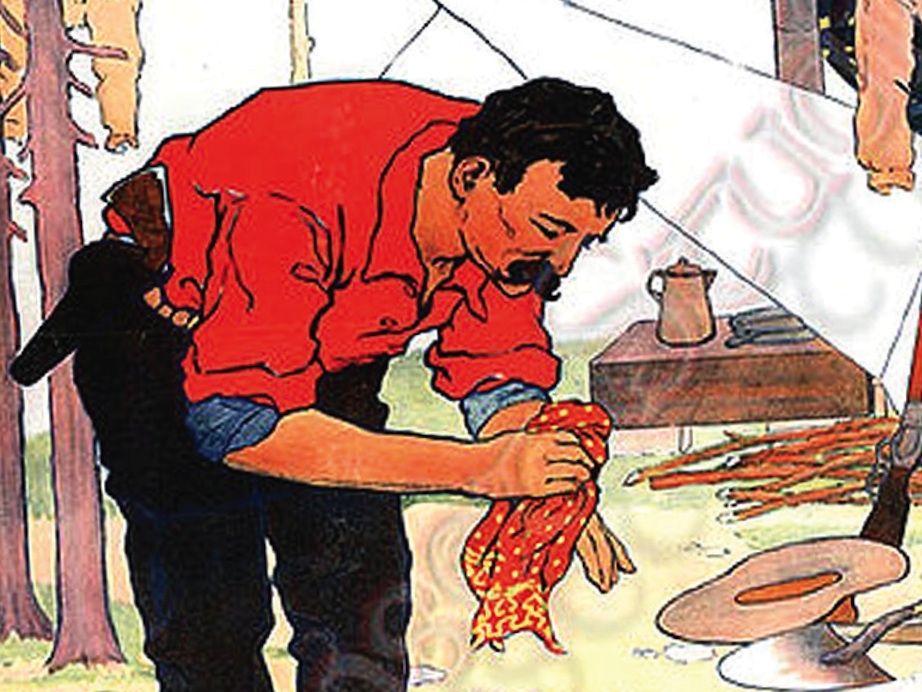This article originally appeared in Canoeroots and Family Camping magazine.
Penny-pinching campers and green-washing skeptics who wonder at the environmental merits of camp-specific “eco” soaps over Sunlight and Pert Plus, read on. The differences run deeper than packaging. But remember, all camp suds must filter through soil to allow bacteria to biodegrade the soap. That means no washing your dishes (or your hair, Fabio) in the lake—fill the camp sink and take it up on shore, at least 200 feet from any water.
Goat Mountain Skinny Dipper Delight Soap
Pros: glows in the dark—never lose your soap again. natural ingredients; also available in goat’s milk “wilderness” varieties with outhouse-humor names like Buffalo patty, skunk scat and Beaver Butt.
Cons: The lather glows too.
Bottom line: Perfect for discrete, total darkness baths.
$5 CDN • www.goatmountainsoap.com
No-rinse Shampoo/Body Wash
Pros: Biodegradable; rub in and towel dry— rinse- and fuss-free.
Cons: Seriously lacking in suds. Biodegradable doesn’t mean natural—contains chemicals and preservatives like propylene glycol, treithanolamine lauryl sulfate (tea) and methyl- and propylparabens that have been linked to serious helath problems in both people and aquatic life.
Bottom line: If you’re paddling in the Dead sea or just hate bathing, this is the soap for you.
$1.50–$4.50 US • www.norinse.com
Dr. Bronner’s Magic Soap
Pros: Contains nothing but organic fair
trade coconut, olive, hemp, jojoba, lavender, peppermint and other natural oils; ingredients are sustainably grown and ecologically processed by coddled farm workers.
Cons: Slippery when wet.
Bottom line: Ideal for dreadlocked, barefoot, vegan, goji berry-scarfing, patchouli-scented, earth-first hippies…and anyone else who gives a damn.
$4.50 US • www.drbronner.com
Campsuds
Pros: Made with vegetable-based, completely biodegradable ingredients. peppermint and lavender bath soap formulas smell delightful and moisturize.
Cons: Anything that “cleans hair, body, dishes, clothes and more” can’t do it all well.
Bottom line: The original green soap (literally and figuratively) since 1965 and still an acceptable, all-round option.
$3.75–$7.25 CDN • www.sierradawn.com
Sunlight dish detergent
Pros: Tough on grease.
Cons: Contains an arsenal of dangerous chemicals. can produce nitrogen and sulphur oxides—the same compounds responsible for acid rain—during decomposition.
Bottom line: Save it for the kitchen sink. Better yet, use a natural, eco-friendly alternative like simple green (www. simplegreen.com) at home, too.
$2 CDN
Ivory Soap
Pros: “The only soap that floats.” Most natural commercial soap choice.
Cons: Contains trace amounts of tetrasodium eDta—a toxic, persistent organic pollutant. Avoid “moisture care” varieties of ivory containing a host of other nasty compounds.
Bottom line: “99 and 44/100% pure” since 1879, and still a safe, economical choice for campers.
$2 US (3 pack) • www.ivory.com
Apple Cider Vinegar
Pros: For a natural shampoo substitute, combine a baking soda solution wash with an apple cider vinegar rinse (1.5 oz/50 ml vinegar to 2 qt/2 l water).
Cons: Opinions differ on whether you can smell the vinegar, but if you need to smell like pomegranates and hibiscus you should probably just stay home.
Bottom line: One enviro maxim has it: if you wouldn’t eat it or drink it, don’t put it in the water. These from-the-pantry ingredients also taste great in bannock and salad dressing, something we can’t say about Beaver Butt.
$4.40 US
This article appeared in Canoeroots & Family Camping, Early Summer 2011.



